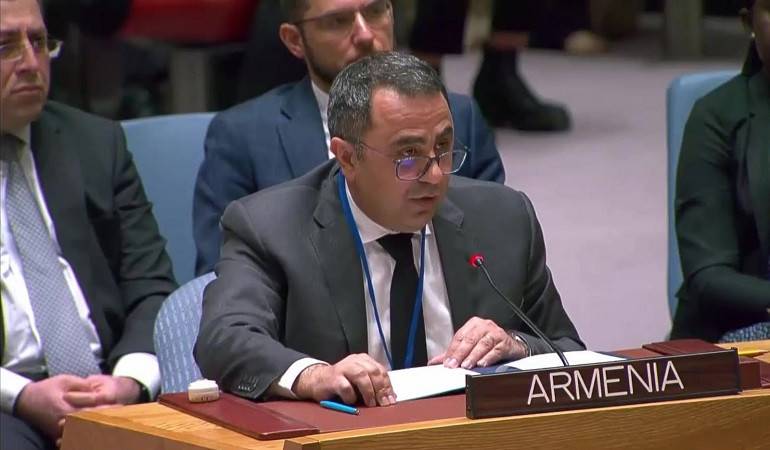Deputy Foreign Minister of Armenia Vahe Gevorgyan deliverd remarks at the meeting of the UN Security Council on the Protection of Civilians in Armed Conflict
23 May, 2023On May 23, Deputy Foreign Minister of Armenia Vahe Gevorgyan participated and delivered remarks at the open discussion of the UN Security Council under the agenda item Protection of Civilians in Armed Conflict, which was chaired by Alain Berset, the President of the Swiss Confederation. UN Secretary-General António Guterres and President of the International Committee of the Red Cross Mirjana Spoljaric made reports.
In his remarks, the Deputy Minister of Foreign Affairs, underscoring the importance of full and unconditional implementation of the Geneva Conventions and their Additional Protocols, emphasised the key role of the UN Security Council in ensuring the implementation of the obligations under the international humanitarian law.
Touching upon the more than 6 months long Nagorno-Karabakh blockade and its humanitarian consequences, Vahe Gevorgyan noted that, contrary to the legally binding order of ICJ, the authorities of Azerbaijan installed a checkpoint in the corridor, thus assuming their responsibility for the illegal blockade and noncompliance with the Court’s Order.
The Deputy Minister stressed that Azerbaijan continuously hinders the activities aimed at addressing the vital needs of the conflict-affected population, and so far it has not been possible to ensure the involvement of the UN and its agencies in Nagorno-Karabakh.
It was underlined that all these illegal actions, accompanied by policies aimed at deepening anti-Armenian hatred and xenophobia, clearly indicate the genocidal intent of Azerbaijan, with a final goal of the total ethnic cleansing of the indigenous population of Nagorno-Karabakh. The Deputy Minister expressed hope that the UN Security Council, as a primary body responsible for the maintenance of international peace and security, will remain seized of the matter and in line with its mandate to ensure dignity, security and fundamental human rights of people.


